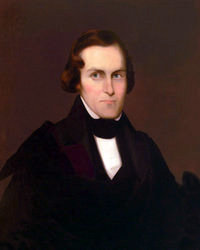Samuel Eells facts for kids
Samuel Eells (1810–1842) was an American lawyer and writer who lived in the 1800s. He started a group called Alpha Delta Phi in 1832 at Hamilton College in Clinton, New York. This group was one of the first "Greek-letter" fraternities in the United States.
Contents
Samuel Eells' Early Life
Samuel Eells was born in 1810 in Westmoreland, New York, a country area. His family came from early settlers in Massachusetts. His father was a religious leader who worked with Native Americans. Samuel learned at home, likely from his mother, before going to Clinton Academy and then Hamilton College.
Samuel was often sick throughout his short life. He struggled with illnesses like tuberculosis. But even with his health problems, he was known for being very curious and determined. He loved to learn and was good at writing and speaking. Before college, to try and get healthier, he walked from Maryland to Massachusetts. Then he sailed to Newfoundland and back, earning his way by fishing.
Why Did Samuel Eells Start Alpha Delta Phi?
Samuel Eells studied at Hamilton College from 1828 to 1832. At that time, the college was having problems, and students were divided. There were secret student groups that argued and competed a lot. College life was very strict back then.
Samuel saw that these groups helped students think and learn. But he didn't like how much they competed with each other. In 1832, he brought together five students to create a new group: Alpha Delta Phi. Their goal was to help students grow in their minds, character, and social skills, without the fierce competition. They wanted to build a community where members cared for each other.
When creating the rules for Alpha Delta Phi, Samuel and his friends used ideas from other student groups and early fraternities. They also used ideas from liberal religious beliefs, the Freemasons, and new ways of thinking called Transcendentalism.
Alpha Delta Phi was the second Greek-letter fraternity at Hamilton College. As it grew, it became the first fraternity at Harvard University, Brown University, and other schools. When it started a chapter at Miami University in Ohio, it was the first Greek-letter fraternity west of the Allegheny Mountains.
Samuel Eells' Career and Ideas
After finishing college, Samuel Eells moved to Ohio, where his father had already gone. On his way, he got very sick but surprised everyone by getting better. In Ohio, he taught at a small school he started. He studied law by himself, passed the Ohio law exam, and began working as a lawyer in Cincinnati.
He was proud to take cases for poor people or those who were not popular, without charging them money. He became well-known and later partnered with Salmon P. Chase. Chase was a famous lawyer who fought against slavery and later became a judge on the Supreme Court.
Samuel Eells also gave many important speeches, especially to religious and charity groups. Many of these speeches were printed and saved. His writings and speeches showed his strong religious beliefs and his hopeful view of the future. He spoke about the value of education, history, and sometimes even about social issues of his time. You can find some of his works in a book called "Memorial of Samuel Eells," put together by his nephew in 1873.
One of his most famous works is "Address to the Biennial Convention of Alpha Delta Phi: On the Law and Means of Social Advancement," from 1839. In this speech, he argued that human history always moves forward. He believed that each new time period brings more friendship among people and more freedom for individuals. Even if there is unfairness, truth and freedom will win in the end. He thought that real progress comes from changes in ideas and beliefs, not just from new inventions or political changes. He believed that spreading Christianity would help create a new time of fairness and peace.
Samuel Eells' ideas were shaped by his family's religious background, by the Age of Enlightenment (a time of new ideas about reason), and by thinkers like Georg Wilhelm Friedrich Hegel and Ralph Waldo Emerson. While his idea of never-ending progress might seem common today, it was a bold and new idea in his time.
Samuel Eells' Last Years
After working with Salmon P. Chase, Samuel Eells tried to practice law on his own again. But his health, which had always been weak, began to fail. He tried different ways to get better, like spending the winter of 1840 in Cuba. However, he died in 1842 in Cincinnati at the home of a friend. He was suffering from arthritis and tuberculosis.
As a symbol of his bravery, the middle joint of his ring finger is kept by the Alpha Delta Phi fraternity. Samuel Eells was buried in the Eells family plot in Woodland Cemetery (Cleveland) in Cleveland, Ohio.
Samuel Eells' Legacy
Today, Samuel Eells' writings are mostly seen as historical items. However, Alpha Delta Phi is still a very active organization. It has two parts: "The Society" and the all-male Fraternity, with many chapters in the United States and Canada.
Images for kids



